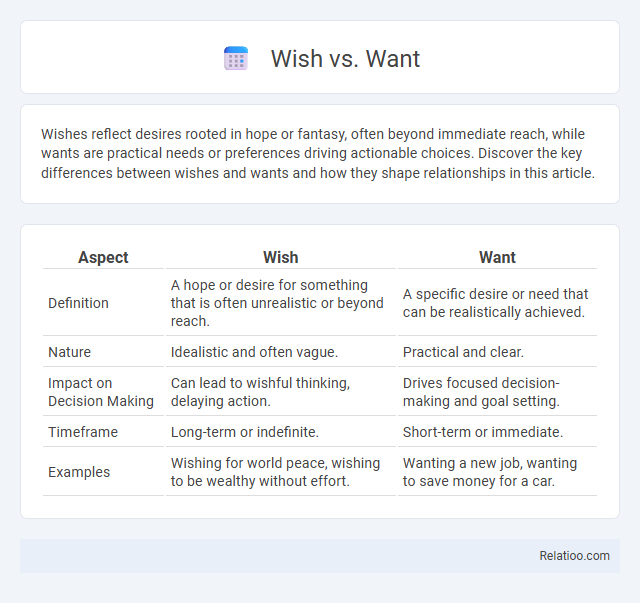Wishes reflect desires rooted in hope or fantasy, often beyond immediate reach, while wants are practical needs or preferences driving actionable choices. Discover the key differences between wishes and wants and how they shape relationships in this article.
Table of Comparison
| Aspect | Wish | Want |
|---|---|---|
| Definition | A hope or desire for something that is often unrealistic or beyond reach. | A specific desire or need that can be realistically achieved. |
| Nature | Idealistic and often vague. | Practical and clear. |
| Impact on Decision Making | Can lead to wishful thinking, delaying action. | Drives focused decision-making and goal setting. |
| Timeframe | Long-term or indefinite. | Short-term or immediate. |
| Examples | Wishing for world peace, wishing to be wealthy without effort. | Wanting a new job, wanting to save money for a car. |
Understanding the Difference Between Wish and Want
Wish and want both express desires, but they differ in intensity and context. A wish often implies a hope for something that is unlikely or imaginary, like wishing for world peace or a magical ability. In contrast, a want is a more immediate and realistic desire related to your needs or goals, such as wanting a new phone or a promotion at work.
The Psychological Basis of Wishing and Wanting
Wishing involves imagining ideal scenarios driven by hope and desire without firm intent, while wanting reflects a motivational state with actionable goals linked to reward anticipation and dopamine activity in the brain. Neuroscientific studies highlight that wanting activates the mesolimbic pathway, associated with craving and goal-directed behavior, whereas wishing engages cortical regions tied to imagination and emotional regulation. Understanding these distinctions clarifies how cognitive processes influence decision-making, emotional responses, and behavioral outcomes in human psychology.
Linguistic Usage: When to Use "Wish" vs "Want
Wish" expresses a desire for something that is unlikely or impossible to happen, often used to convey regret or hypothetical situations, as in "I wish I were taller." "Want" denotes a straightforward desire or need for something attainable or immediate, such as "I want a new phone." Use "wish" for unreal or hypothetical desires and "want" for real, practical wants or needs in linguistic contexts.
Emotional Implications of Wishes and Wants
Wishes often reflect deep emotional desires that may feel distant or unattainable, carrying a sense of hope or longing, while wants express more immediate, practical needs linked to your current emotional state. Understanding the emotional implications of wishes versus wants helps clarify your motivations and guides more intentional decision-making. Recognizing whether your feelings stem from a hopeful wish or a genuine want can improve emotional self-awareness and personal fulfillment.
Real-Life Examples: Wish vs Want in Everyday Situations
In everyday situations, you wish for things beyond your control, such as wishing for better weather during a picnic, while you want items or outcomes you can actively pursue, like wanting a new phone or wanting to improve your fitness. Understanding the difference helps clarify your goals and emotions; for example, you want extra hours to work on a project but wish you could pause time. Real-life examples highlight how wishes express hope or desire for change without immediate action, whereas wants reflect intentions and plans you can work toward.
Cultural Perspectives on Wishing and Wanting
Cultural perspectives on wishing and wanting reveal distinct emotional and social nuances; for example, in East Asian cultures, wishing often emphasizes harmony and collective well-being, while wanting is more individually oriented and subtly expressed to maintain social cohesion. Western cultures typically encourage explicit expression of wants as a form of personal empowerment, whereas wishes may reflect aspirations or hopeful desires often shared in communal or celebratory contexts. Understanding these cultural differences enriches communication and highlights how language shapes the manifestation of desires across societies.
How Wishes Influence Aspirations
Wishes often serve as the emotional foundation that shapes your deepest aspirations, providing motivation and hope for future achievements. Unlike wants, which are immediate desires for tangible objects or outcomes, wishes tend to reflect long-term goals and ideal scenarios that inspire personal growth and perseverance. Understanding the distinction between wishes and wants can help you prioritize your efforts and focus on meaningful aspirations that align with your values.
The Role of Wants in Goal Setting
Wants play a crucial role in goal setting by representing specific desires that motivate your actions and decisions, bridging the gap between vague wishes and concrete plans. Unlike a wish, which often expresses a passive hope, a want implies intentionality and the readiness to pursue a particular outcome, making it essential for setting achievable goals. Understanding the distinction between wish and want helps you prioritize objectives and allocate resources effectively to turn aspirations into measurable achievements.
Common Mistakes with Wish and Want in English Grammar
Many English learners confuse "wish" and "want" because both express desires, but "wish" is used for unreal or hypothetical situations, while "want" refers to real, immediate needs. A common mistake is using "wish" to express a simple desire, such as saying "I wish a new phone," instead of "I want a new phone." Correct usage involves "wish" with past tense forms to indicate unreal wishes (e.g., "I wish I were taller") and "want" for straightforward desires (e.g., "I want a new phone").
Practical Tips to Distinguish Wish from Want
Wishes express desires for situations often beyond current reality, such as wanting to live in a different country or have a superpower. Wants refer to specific, actionable desires that can be fulfilled in the near term, like wanting a new phone or a cup of coffee. To distinguish between them, evaluate feasibility and immediacy: if the desire involves realistic and attainable goals, it's a want; if it involves improbable or hypothetical scenarios, it's a wish.

Infographic: Wish vs Want
 relatioo.com
relatioo.com